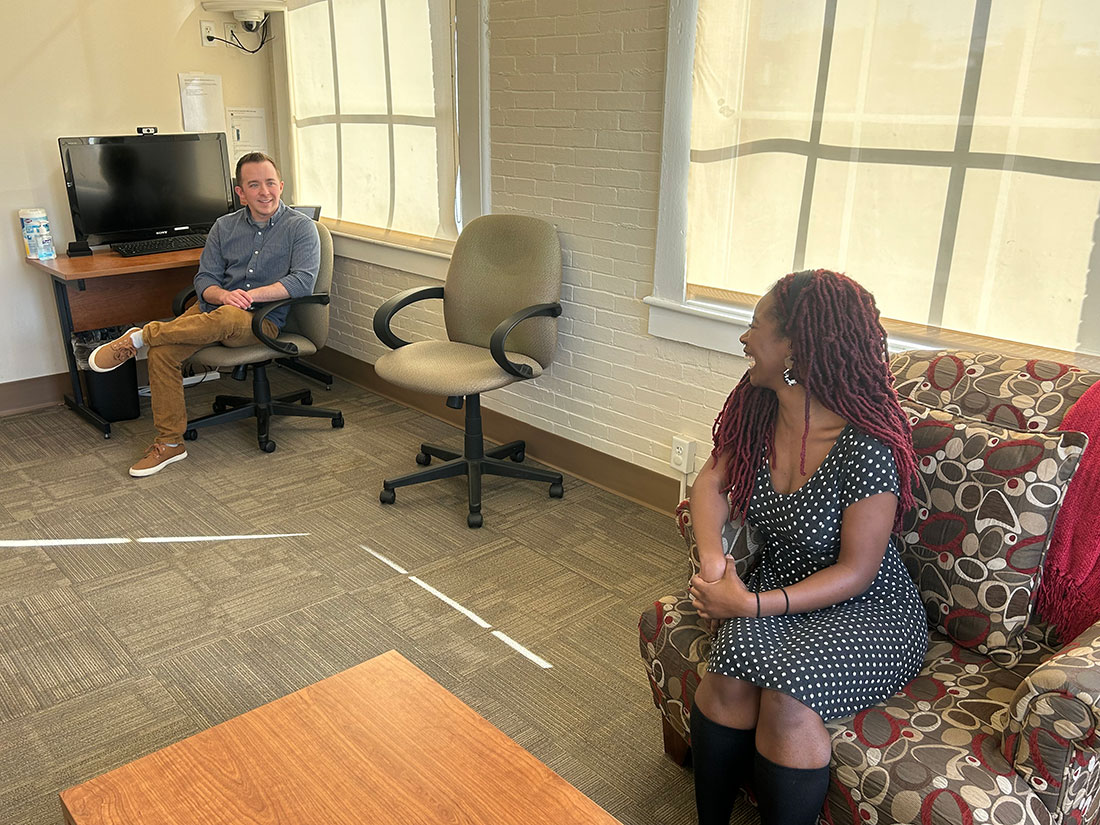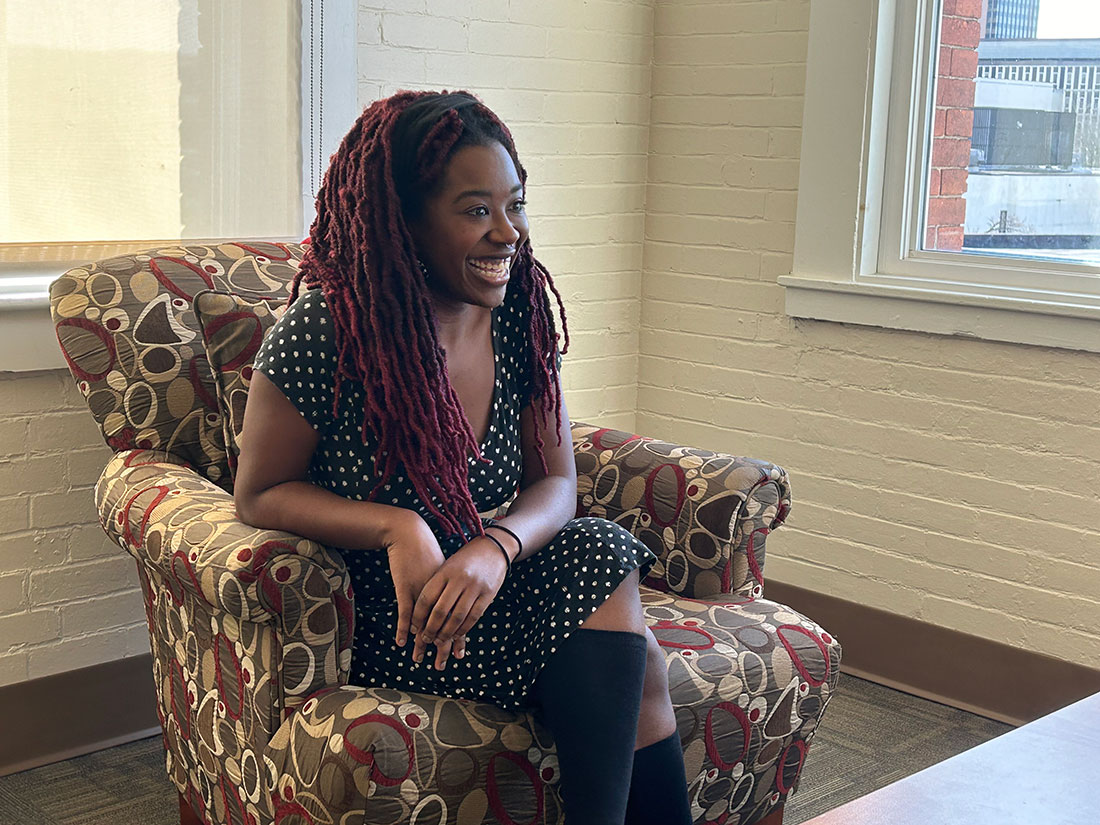
In 2023, student therapists from the Department of Marriage and Family Therapy in Syracuse University’s Falk College of Sport and Human Dynamics provided a total of 9,134 therapy sessions to 682 individuals. Those free sessions in the Couple and Family Therapy Center at Peck Hall included 3,713 for individuals and 5,412 for couples and families.
Think about those numbers for a minute . . . and the impact the sessions had for those in the community surrounding the Syracuse University campus.
Therapy Sessions in 2023:
“If not for the hard work of our students and faculty – given the dire state of mental health services in our community and most communities – it’s likely many of these clients would experience long waitlists elsewhere, reduced services due to expense, or go without mental healthcare altogether,” says Tyler Sliker, clinic director at the Couple and Family Therapy Center. “This work is truly critical to our community and beyond as it’s training much-needed therapists and providing much-needed care.”
Indeed, this is a mutually beneficial arrangement as students seeking to earn their master of arts degree or Ph.D. in marriage and family therapy are provided real-life opportunities to hone their craft.
“The thing about studying to be a therapist is that the only way to learn is by doing,” says Kalila Taylor, who’s on track to earn her master’s degree in May. “I was incredibly nervous when I first started seeing clients, but with the support of my colleagues and supervisors, I was able to develop my skills and build my confidence as a therapist.”
Taylor, who’s from Jacksonville, Florida, earned her bachelor’s degree in philosophy with a minor in psychology from Florida State University. In researching graduate programs, she discovered Syracuse University and the exceptional reputation forged by the Department of Marriage and Family Therapy, which offered the first accredited master’s degree in the country.
“I’ve always wanted to better understand human behavior and have been continuously fascinated by how we relate to one another as people,” Taylor says. “Marriage and family therapy combines a lot of my various interests while also being a field that gives me the opportunity to make a real difference in peoples’ lives.”
Student therapists start seeing clients when they’re enrolled in MFT 760 (Practicum in Marriage and Family Therapy), and that’s typically in their second semester of the program. Sliker says their caseload varies depending on client need and the readiness of the student, but ideally students start their clinical work with four to five cases.

Eventually, Taylor was providing up to 20 sessions per week.
“I think it can be especially challenging to help a client process an experience that you haven’t worked through yet in your own life,” she says. “Again, that’s why supervision is so important so that you get the opportunity to talk through your own personal obstacles to show up better for your clients.”
To ensure quality training for the student therapists and beneficial care to their clients, the Marriage and Family Therapy faculty and staff provide supervision to the students working with the individuals, couples, and families. In 2023, faculty and staff provided more than 1,800 hours of supervision to 16 students.
The students are supervised on a weekly basis, at minimum, and Sliker says it’s common for student therapists who are just getting started to reach out to on-call supervisors between their regularly scheduled supervision meetings. Marriage and family therapists are only able to see clients unsupervised when they’re fully licensed.
In New York State, that’s roughly two years after graduation, if they’ve been working full-time as a therapist since receiving their graduate degree. If you’re a member of the community who meets with a fully licensed marriage and family therapist, and that therapist is licensed in New York, you can expect your therapist has had about 3 ½ years of supervised clinical experience, including their 1 ½ years of graduate school.

“Then the path to becoming a great therapist, in my opinion, is forged by the therapist’s continued investment in their growth and development, a lifetime connection with supervisors and mentors, and genuine care for the clients they serve,” Sliker adds.
Taylor says there’s an immense feeling of satisfaction when a therapist is able to form relationships with clients, watch them progress in real time, and help them develop skills they didn’t have at the start of therapy. In what may seem like a strange twist to someone outside of the therapy sessions, Taylor says one of her proudest moments occurred when a couple she was working with chose to separate.
“I don’t believe it’s the job of a therapist to tell clients what to do because I think clients should be treated like the experts of their own experience,” Taylor says. “I was proud of this couple for coming to the realization that breaking up was the best thing for both of them because that can be one of the most difficult decisions to make. I remember those clients thanking me for helping them throughout the process, which was such an amazing moment that provided to me a lot of encouragement.”
For Taylor, it was a rewarding moment among many that occur for student therapists every day at the Couple and Family Therapy Center.
“Becoming a therapist is similar to learning a craft or an art: One learns by doing,” Sliker says. “So as much as our community benefits from the services the Couple and Family Therapy Center provides, the students are benefiting just as much.”
The Couple and Family Therapy Center is open from 9 a.m. to 7 p.m. Monday through Thursday and 9 a.m. to 4 p.m. Friday. The center provides free, confidential sessions in-person and virtually. To inquire about receiving therapy services, call 315-443-3023.
